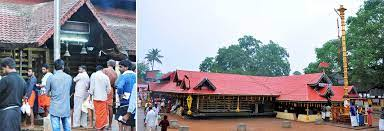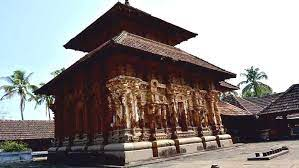Harikanyaka Temple of ariyannur
Here is a great temple of Mohini avatharam of Lord Vishnu, just 4 km from Guruvayur.
Humble request to all pilgrims to Guruvayur.PLese visit this temple
(Copied from https://kshetradanam.org/sree-harikanyaka-ariyanoor-temple-cherukkunu )
Brief history and temple administration:
Datable to the ancient period, it is one amongst the
108 Durga temples in kerala.
There are two pradishtas within the Sreekovil, of Sree
Harikanyaka and Sree Shastha. Sree Harikanyaka is Sree Mohini, the most enchantingly
beautiful form of a damsel assumed by Lord Vishnu for distributing amruth
(nectar) among the Devas and Asuras in the episode of Palaazhi-Madhanam. When
Lord Hari assumed the original form of Sree Maha Vishnu after his mission and
when Lord Siva expressed his desire to see the enchanting form of Sree Mohini,
Lord Vishnu by His maya once again took that form and attracted Lord Siva. Lord
Siva easily duped by maya, but He could regain and resume His original form.
(As narrated in Sreemad Bhagavatham Puranam, Adhyayas 8 and 12 of Skanda
Eight). In the Balakandha of Kambaramayanam the origin of Lord Shastha is
explained as the son of Sree Sankara in Sree Mohini and Lord Shastha is said to
have emerged from the thigh of the childish damsel Sree Mohini. Being a kanyaka
born out of Lord Hari the damsel is known as Harikanyaka. Sree Shastha
signifies the combination of jnana (knowledge) of Siva and the Vishnu-maya
(merciful charm) of Vishnu. Both these idols, Sree Harikanyaka and Lord Shastha
are installed in the same shrine. In Brahmani-pattu, Sree Harikanyaka Devi is
praised. It may be reported that in temple rituals whenever the utsava vigraha
of Goddess Harikanyaka is taken out, that of Lord Shastha also is made to
accompany Her.
Another notable feature is that ruling Rajas and tuskers are
not permitted to enter the temple. Female elephants are permitted to enter the
temple premises and they alone are allowed to take the utsava vigraha. An
interesting thing noticed in the temple is the head portion of a sila at the
northwest corner (outside the naalambalam). It is said that this sila grows in
size.
The temple is famous for mangalya bhagyam to maidens.
Swayamvara pushpanjali is an important vazhipadu of the temple.
The Sreekovil is believed to have been built by Sree
Perumthachan. The uli (chisel) used by him for constructing the Sreekovil are
fixed in the kumudam part of the adhishthaanam.
The floor of northern naalambalam produces a peculiar sound
as that of walking on a wooden floor. It may be presumed that this portion was
perhaps built by Perumthachan meant to be a dancing-stage for the Goddess.
This temple in ancient times was a maha-kshetram and was
earlier used by members of 72 illams and later only by seven illams. As there
was conflict between the members of these families (illakkars), Trissur
Thekke-Swamiyar Madom took over its management. Later they entrusted it to two
hereditary families of Vadakkumpat mana and Otaloor mana.
During an attack on the temple by some miscreants the idol
was broken. As revealed in deva-prashnam, the idol was covered in 1120 K.E.
(1945 A.D.) by a pancha-loha golaka.
The temple was taken over by the Cochin Royal family in 1100
K.E (1935 A.D.) and was later transferred to the Cochin Devaswam Board in 1950.
It is presently administered by Ariyannoor Devaswam Officer appointed by the
Board.
There is mention about this temple in Kerala Sahitya
Charitram of Ulloor S. Parameswara Iyer (Vol.I, p.159)) and also in the famous
Manipravaala kavyam of Chandrotsavam.
Architecture / Structure:
At one time the
properties of the temple extended over an area of about 20 sq. km. It reached
up to the Guruvayoor temple. But now it has only an extent of 1.25 acres. The
temple has all five prakaram (akathe-balivattam, chuttambalam, vilakkumaadam,
bahya-hara and maryaada). The structures thereon are Sreekovil with
mukha-mandapam, sub-shrines, namaskaara-mandapam, chuttambalam with agra-mandapam,
vilakkumaadam, valiya-balikkall, deepastambhams, gopuram, maryaada, well and
Pond.
The square dwi-thala Sreekovil of sandhaara type and facing
east has granite upa-peetham and adhishthaanam and laterite stone walls. The
mouldings of upa-peetham are jagathi, kumudam and padi, while those of
adhishthaanam are paadukam, jagathi, Vrutha kumudam, kumuda padi, kampam,
galam, gala-padi with Vaajana motif, galam, utharam, kampam, kapotham, kampam,
galam with flower motif, gala-padi, valaru and padi. Vyaali-mukham are seen
carved on kumuda-padi. The sopanam has six direct steps with vyaali-face at top
and niches and decorations at sides of banisters. In addition Makara-simha
faces are also carved at the curve of banisters. The pranaalam has makara simha
face at the base, multi-faceted sundu and gomukha end. The pranaalam starts
from the outer wall of the garbha gruham and is a single piece with provision
to drain lustral water through a hole made at its middle. The walls have
decorations of Gana-Bhoothas. Both at the greeva and at the wall motifs ten
elephants are carved. The roof of eka-thala part is made of dressed laterite
stones and lime, while that of dwi-thala is tiled. The Sreekovil has a
mukha-mandapam. The namaskaara-mandapam has 16 pillars, 4 with bigger diameter
and 12 with smaller diameter. A deepastambham is installed in it facing the
idol. Within the akathe-balivattam at northwest there is a sub shrine for Sree
Vana-Bhadrakali (with aal-thara) and a well at northeast. This idol was found
to grow in size. When the devotees started worshipping it many evil things
happened. Hence poojas are not performed in this shrine. The idol, at present,
is within a grove and no worship is done here. It may be noted that daily bali
is offered in this well also. There are two nadapanthals built within
akathe-balivattam as projections from naalambalam, the southern one projecting
from the thidappali and the northern one on the western side of the well. The
entire akathe-balivattam is covered with granite stones
The chuttambalam has only the entrance from east. The
thidappali is at southeast. The sub-shrine for Lord Ganapati is at the southern
naalambalam. Chuttu-vilakks are fixed on the trellis work of the outer wall of
vilakkumaadam. The valiya-balikkall is within the agra-mandapam .There is a
deepastambham at the front. The sub shrine of Goddess Bhadrakali is located at
southwest corner facing east. A sila deepastambham is installed at its front.
The maryaada is made of laterite stones. The gopuram is at the east. On the southern
granite pillar of the gopuram, muzhakkol (wooden scale) used for building the
temple is engraved. The temple tank is very extensive with well-laid steps.
Carvings and paintings:
The temple is rich in architecture. The walls of the
Sreekovil (both at lower part and greeva) have niches. In the mukha-mandapam,
ten gaja-mukha motifs made of sila are installed. On the ceiling of namaskaara
mandapam, wooden figurines of ashta-dikpaalakars are engraved in the coffers.
On its sides Dashavatharam, Sreekrishnaleela. Devasura ganas,
palaazhi-madhanam, flowers and other motifs are beautifully carved in wood. On
the ceiling of agra-mandapam also nava-graha sthanas are engraved, besides some
carvings. On the front granite pillars of naalambalam, two figurines of rishis
are engraved. Ganabhootas holding lamps are also carved on the two pillars of
the rear. Mural paintings exist on the walls of Sreekovil, but have faded.
Deities:
The krishna-sila idol of standing pose (height: 2.15 m.)
covered with a pancha-loha golaka, has four arms with disc, ball and conch in
three hands, while the fourth one is in abhaya pose. The sankalpam of the deity
is Sree Harikanyaka or Mayamohini form of Lord Vishnu. A pancha-loha tidambu is
also installed within the garbha-gruham with the sankalpam of Lord Shastha as
mentioned earlier. The other two idols are made of sila, Lord Ganapati sitting
pose and Goddess Bhadrakali of mirror type
Pooja Timings:
The temple is kept open from 5 to 9-30 a.m. and from 5 to 8
p.m.
Five poojas are held daily,
Usha-pooja (6 a.m.)
Ethrithu-pooja (6-30 a.m.)
Pantheeradi-pooja (8 a.m.)
Uccha-pooja (8-45 a.m.) and
Athaazha-pooja (7-30 p.m.)
besides Sandhya-deeparadhana (6-30 p.m.) and (Thrippuka (8
p.m.) are also held daily.
Vazhipadu / Offerings:
Pushpanjali, Bhagavathi-seva, koottu-payasam and Maha
Ganapati homam are the main vazhipadu of which pushpanjali is popular.
Ulsavam / Important Days:
The Pooramahotsavam is held for 15 days. The festival period
commences on Pooram nakshatram of Meenam with offerings to Lord Ganapati. The
Kodiyettam is on the eighth day (Uthram nakshatram), of the festival period. On
this day Brahmani-pattu is performed during daytime at the mandapam.
Utsava-bali is held from 2nd to 5th days (the days counted after Kodiyettam).
Utsava-bali for five days is rarely done in temples. Goddess is taken during
ezhunnellath on a female elephant. Along with Devi Lord Shastha is also taken
around. On the 6th day of the utsavam navorru-pattu by Mannars and on the
seventh day navorru-pattu by Paanars is performed. On the last day aarattu is
held. Thullal and modern entertainments are held on festival days.
Priesthood and temple staff:
Details of the thantri who installed the idol are not known.
The present thantri belongs to Puliyannoor mana of Elavalli (Chavakad taluk).
The shantikkaran is appointed from Embranthiri or Malayala Brahmins. The other
staff includes four kazhakam, three adichu-tali, one Marar and one person each
for kuzhal and ilathalam.
Location:
Situated four km. northeast of Guruvayoor at Ariyannoor and
thence 200 m. east at Cherukunnu, the temple is connected by tarred road.
Facilities for stay are available at Guruvayoor.
More about it https://www.youtube.com/watch?v=jDEpgw-eMC4&ab_channel=TatwamayiNews















